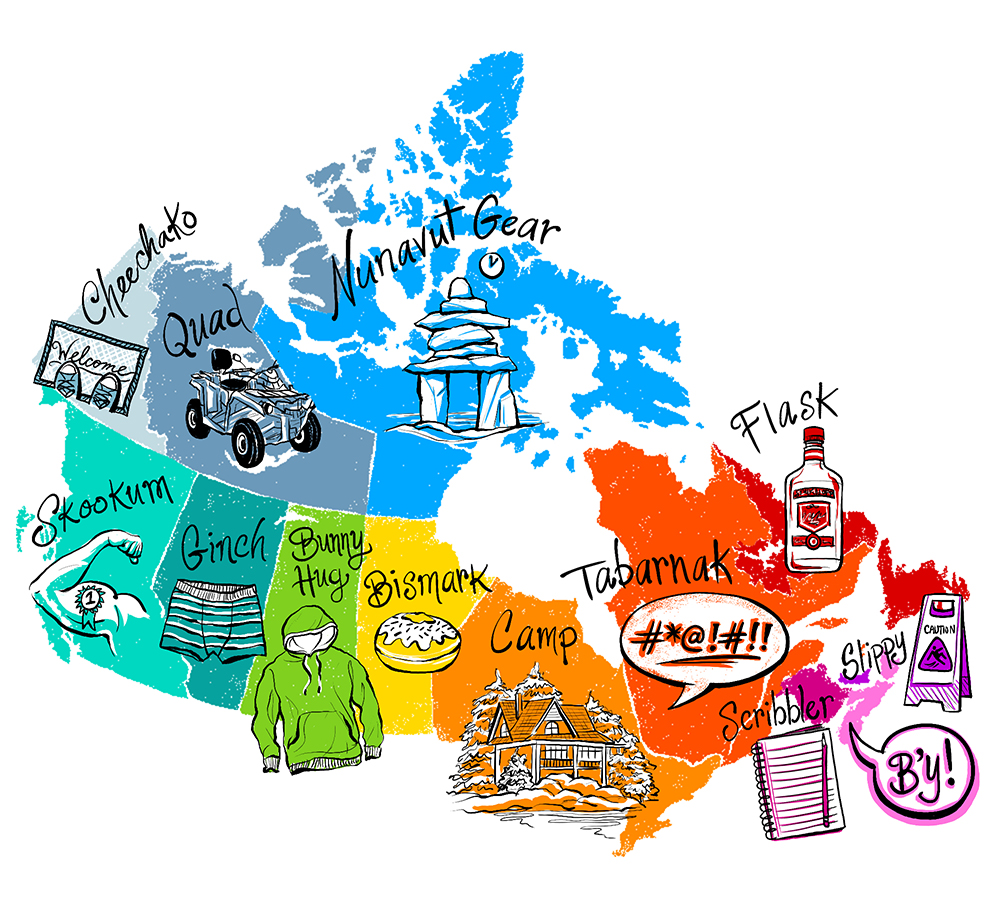On July 1, Canadians from coast to coast will celebrate the Great White North's 150th birthday. And since G Adventures is headquartered in Canada — we were founded in 1990 in Toronto, Ontario — we thought it only fitting that we dedicate a week to weird, wild and wonderful stories about the second biggest country in the world. Happy 150th birthday, Canada!


Illustration by Chloe Cushman.
As a country, Canada has a reputation for cold weather, a polite population and, these days, a very photogenic prime minster. But the Great White North is also home to its own linguistic idiosyncrasies that go well beyond “homo milk” (homogenized milk, or whole milk) and the way we pronounce the word sorry. In fact, Canada has its own regional jargon, which differs from coast to coast, and reflects the country’s French and British heritage, and that of the Indigenous peoples who lived here long before settlers arrived. Here, a brief look at some of the peculiar Canadian slang you’ll find from coast to coast, and what each term means.

Illustration by Chloe Cushman.
Flask
What it means: A mickey (in the rest of Canada), or a pint (in the rest of the world) of liquor; a 13oz (375 mL) bottle of booze no matter where you are
Where they say it: Newfoundland, and occasionally elsewhere in the Canadian Maritimes

Illustration by Chloe Cushman.
B’y
What it means: A contraction of the word “boy,” spoken with a characteristic East Coast Canadian inflection.
Where they say it: Cape Breton Island, in Nova Scotia, Newfoundland, and elsewhere in the Maritimes

Illustration by Chloe Cushman.
Scribbler
What it means: Notebook
Where they say it: New Brunswick, and elsewhere in the Maritimes

Illustration by Chloe Cushman.
Slippy
What it means: Slippery
Where they say it: Prince Edward Island, almost exclusively

Illustration by Chloe Cushman.
Tabarnak
What it means: Literally, a tabernacle; less literally, it’s an expletive that Quebec French-speakers would use in place of, say, “shoot”
Where they say it: Quebec

Illustration by Chloe Cushman.
Camp
What it means: A cottage or cabin. Used in a sentence, it’s “I’m going to camp this weekend,” not “I’m going to a camp” or “I’m going to the camp”
Where they say it: Ontario, mainly in the north

Illustration by Chloe Cushman.
Bismark
What it means: A cream-filled doughnut
Where they say it: Manitoba; in Alberta and Saskatchewan, a “bismark” is a jelly-filled doughnut (in Manitoba, this is referred to as a “jambuster”)

Illustration by Chloe Cushman.
Bunny Hug
What it means: A hooded sweatshirt
Where they say it: Saskatchewan

Illustration by Chloe Cushman.
Ginch
What it means: Men’s underwear
Where they say it: Alberta. "Gitch" and "gonch" are also used, and this terminology is common in Saskatchewan, Manitoba and British Columbia, as well.

Illustration by Chloe Cushman.
Skookum
What it means: “good,” “greatest,” strong,” or “powerful”
Where they say it: The word, which has its origins in Chinook jargon, is commonly used in British Columbia and elsewhere in the Pacific Northwest

Illustration by Chloe Cushman.
Cheechako
What it means: A newcomer
Where they say it: This word also has origins in the Chinook language, and is used in the Yukon, as well as Alaska

Illustration by Chloe Cushman.
Quad
What it means: A four-wheeler or all-terrain vehicle.
Where they say it: Mainly in Canada’s more rural, northern regions, like the Northwest Territories, but it's used throughout Canada

Illustration by Chloe Cushman.
Nunavut gear
What it is: The pace of things in Nunavut, where daily life is largely affected by weather patterns
Where they say it: Nunavut
Getting there
Ready to try your hand at Canadian slang? G Adventures can help. Check out our small group tours to Canada here.























